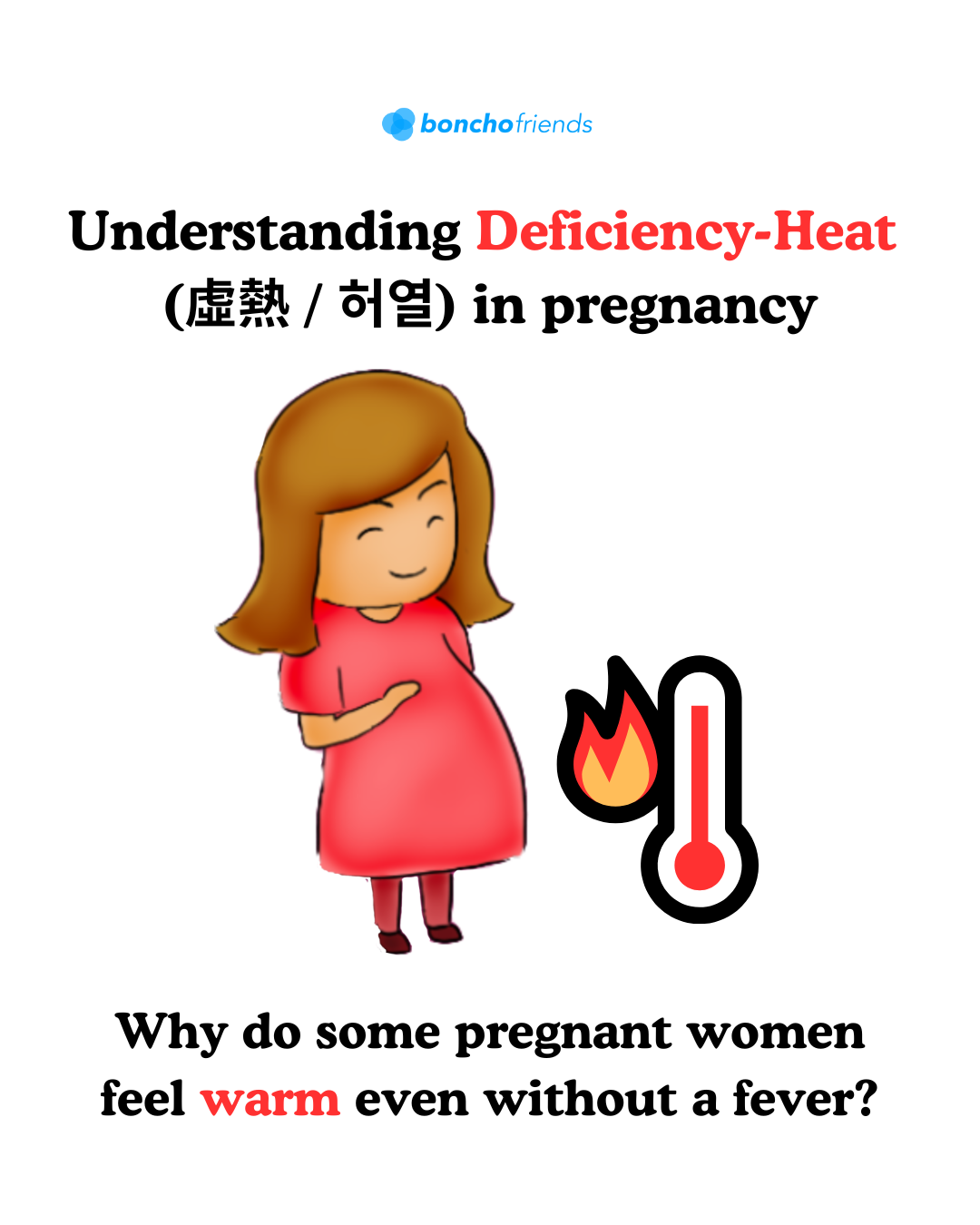
Deficiency-Heat During Pregnancy
Share
In Traditional Chinese Medicine (TCM), Deficiency-Heat (虛熱 / 허열) during pregnancy is not simply “having a fever.”
It’s a gentle internal warmth that arises when the body’s Yin (陰), Qi (氣), and Blood (血) become relatively depleted while supporting the growth of new life.
This warmth is often a physiological change, not an illness — a reflection of how deeply the mother’s energy is being shared with her baby.
🌕 Physiological Mild Warmth
During early pregnancy (around 13–14 weeks), hormonal and energetic changes naturally raise the basal body temperature.
From a TCM point of view, this is when the Chong (衝脈) and Ren (任脈) channels flourish, guiding Yin and Blood to nourish the fetus.
As Yin becomes more focused on fetal development, the mother’s own cooling and moistening functions decline slightly, leading to a mild internal warmth or Deficiency-Heat (虛熱 / 허열).
This mild warmth—often between 36.7–37.7°C—is considered normal and physiological.
You might feel slightly warm at night, experience dry lips, or notice a bit of fatigue or restlessness.
It’s a gentle sign that your body is working beautifully to sustain new life.
🔥 When Warmth Becomes Pathological
If the body temperature rises above 38°C, or if symptoms like chills, sore throat, or muscle pain appear,
this is no longer physiological Deficiency-Heat but rather an Excess Heat (實熱) or external pathogenic influence (外感).
High fever during early pregnancy, especially within the first 12 weeks, can affect fetal development—
including the risk of neural tube defects or heart malformations—so immediate medical attention is needed.
Even in TCM, this is the time to seek professional diagnosis and coordinated care between your OB and TCM practitioner.
🌸 TCM Principles for Managing Deficiency-Heat
When treating heat in pregnancy, TCM emphasizes gentleness.
Strong purging or heavy-cooling herbs (like Qing Re Xie Huo, 清熱瀉火) are never used.
The goal is not to suppress the warmth, but to replenish Yin and Blood, harmonize Qi, and calm the Spirit.
Key Principles
- Nourish Yin (補陰): replenish fluids to reduce internal heat.
- Nourish Blood (養血): keep circulation balanced to prevent floating warmth.
- Calm the Spirit (安神): soothe emotional tension, anxiety, or insomnia.
- Support the Spleen and Qi (健脾益氣): help digestion and maintain strength.
🍐 Lifestyle & Self-Care
In most mild cases, daily habits are more effective than herbs.
Focus on replenishing your Yin through simple, nurturing practices:
💧 Stay hydrated. Drink warm or room-temperature water throughout the day to nourish body fluids.
🧘♀️ Rest often. Yin restores itself during stillness and calm.
🥣 Eat Yin-nourishing foods such as steamed pear, lotus root soup, white fungus, or goji berry congee.
👕 Wear breathable clothing made from soft, natural fabrics.
🌙 Maintain emotional balance. Try gentle Qi Gong, mindful breathing, or short meditation.
💬 When to Seek Professional Care
- Body temperature stays above 38°C for more than 24 hours
- Fever comes with chills, pain, or inflammation
- Any fever occurs within the first trimester
Always consult both your OB and a licensed TCM practitioner who has experience in pregnancy care.
💛 The Boncho Friends Perspective
Mild warmth in pregnancy is often a sign of life force, not disease.
But TCM reminds us: every pregnancy, every constitution, and every stage is unique.
That’s why there’s no single formula or herb list that fits everyone.
Pregnancy care must be personalized, gentle, and guided by close observation.
Instead, TCM practitioners tailor care individually:
sometimes with gentle supportive formulas and often with food therapy and lifestyle balance rather than herbs alone.
Because pregnancy care requires thoughtful precision, we created a deeper, practitioner-level guide—Herbal Formulas for Pregnancy Support in TCM 🌸
Inside, you’ll find:
• Stage-by-stage notes on pregnancy support and herbal formula recommendations
• Herb safety levels and gentle substitutions
• Practitioner-level critical thinking prompts
💌 Comment “PREGNANCY” on our IG post (Understanding Deficiency-Heat in Pregnancy Post) to receive a private link to the guide!
We want you to see that TCM is not about memorizing one safe list — It's about understanding the logic behind safety and adaptation.
For TCM Students and practitioners who are reading this:
✨ Think holistically.
✨ Think critically.
✨ Remember that TCM isn’t about memorizing “safe lists” — it’s about understanding balance, context, and adaptation!
